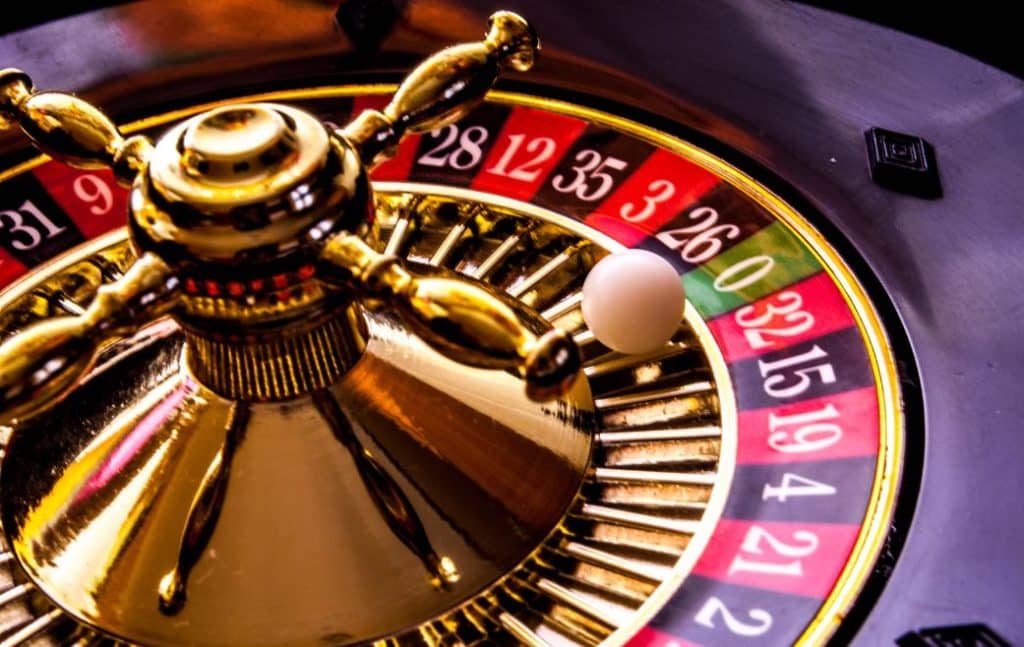- Crypto Casinos
- Bitcoin Games
- Reviews
- Learn
- Essentials
- Are Bitcoin Casinos Legal?
- Crypto Wallets for Gambling
- VPN for Bitcoin Casinos
- What is RTP?
- Gambler’s Fallacy
- Deposit with Credit Card On Bitcoin Casino
- Bankroll Management
- How To Play Bingo
- What Casino Game Has the Best Odds
- Best Casino Game To Win Money
- How VIP Programs Work
- RNG in Casinos
- Slot Machine Odds
- How Free Spins Work
- Poker Cheat Sheet
- Guides
- How to Play Texas Holdem Poker
- How to Play Three Card Poker
- How to Play Pai Gow Poker
- How To Play Omaha Poker
- How to Play Caribbean Stud Poker
- How to Play Seven Card Stud
- How to Play Mississippi Stud Poker
- Poker Odds Guide
- Card Counting in Blackjack
- What is a Blackjack Split
- What is a Push in Blackjack
- Roulette Wheel Explained
- How to Play Craps
- Craps Odds Explained
- Craps Come Bet
- How to Play Baccarat
- Moneyline Betting Explained
- Arbitrage Betting Explained
- How Sportsbetting Betting Odds Work
- Video Poker Odds
- Limit vs No Limit Poker
The Hidden Codes of the Roulette Wheel: Unlocking the Mysteries of Numbers and Strategies
The game of roulette, with its spinning wheel and air of elegance, has long captivated gamblers around the world. Originating in 18th-century France, roulette has evolved from its humble beginnings into a casino staple known for its unique combination of chance, strategy, and excitement.
At the heart of this allure is the roulette wheel, a symbol of fortune and fate. This article aims to demystify the numbers and layouts of the roulette wheel, offering players insights into how these elements influence the game’s outcome.
Understanding Roulette Wheel Numbers
The roulette wheel’s layout is a marvel of balance and design. The numbers are not placed sequentially but are distributed to balance several factors. This part of the article will explain the rationale behind the wheel’s number arrangement, emphasizing how red and black, odd and even, and high and low numbers are interspersed.
European roulette features numbers 1-36 and a single zero, making it 37 pockets in total. The American version adds a double zero, increasing the count to 38. This section will discuss how this additional double zero affects the game, focusing on the odds and house edge in each variant.
Zero pockets (‘0’ in European and ‘0’ and ’00’ in American roulette) are what give the house its edge. This subsection will delve into the statistical impact of these pockets. It will cover how their existence influences betting outcomes and overall game strategy.
Here, the discussion will turn to the probability of winning on each type of wheel. By understanding the mathematical underpinnings of the game, players can better grasp how the presence of zero and double zero affects their odds.
The concept of the house edge is crucial in roulette. This part of our guide here at Bitcoin Casinos will break down how the European wheel’s 2.7% house edge compares to the American wheel’s 5.26%, providing insights into which version of the game is more favorable to players in terms of odds.
Roulette Wheel Sequences and Layouts
The design of a roulette wheel is a marvel of intricacy and strategy, finely balanced to ensure unpredictability and fairness. Standard roulette wheels come in two primary types: the American and the European.
The American wheel features 38 pockets with numbers 1-36, a single zero, and a double zero. Conversely, the European wheel comprises 37 pockets, featuring numbers 1-36 and only a single zero. This subtle difference significantly impacts the game’s odds.
On both wheel types, the numbers are not listed sequentially. Instead, they follow a specific order designed to balance high, low, red, black, even, and odd numbers. For example, on a European wheel, directly across from each odd number is the next higher even number.
The arrangement is carefully calculated to eliminate any bias and to ensure that each spin is independent of the previous one.
How Wheel Layout Impacts Betting Strategies
The layout of the roulette at a casino or even an online roulette wheel influences player betting strategies significantly. On the American wheel, the presence of the double zero increases the house edge, making certain betting strategies less effective. For instance, betting on red/black or odd/even results in a higher probability of loss due to the extra zero pocket.
European roulette, with its single zero, offers better odds for players. This difference encourages strategies like the Martingale system, where players double their bet after a loss. Such strategies might be riskier or less effective on an American wheel due to the higher house edge.
Variations in Roulette Wheels
Beyond the well-known American and European wheels, other, less common types offer unique gameplay experiences. One notable variant is the French roulette wheel, which is similar to the European wheel but features a different table layout for bets and certain rules like ‘La Partage’ and ‘En Prison’ that can significantly reduce the house edge on even-money bets.
Another intriguing variation is the Sands Roulette, found primarily in some casinos in Las Vegas. This wheel includes a triple zero, further increasing the house edge. The addition of another zero changes the odds and potential payouts, requiring players to adapt their strategies accordingly.
How These Variations Influence Gameplay and Betting
The variations in roulette wheels exert a considerable influence on both gameplay and betting strategies. In French roulette, the ‘La Partage’ rule, where players lose only half their bet if the ball lands on zero on an even-money bet, and the ‘En Prison’ rule, where the bet is held over for the next spin, both offer a significant advantage to players.
In contrast, Sands Roulette, with its triple zero, poses a higher risk, which might deter risk-averse players or those with a preference for strategies that rely on lower house edges. Such variations not only add diversity to the game of roulette but also challenge players to modify their approaches and strategies to suit the specific characteristics of each wheel type.
Strategies for Betting Based on Wheel Layout
The fundamental difference between European and American roulette wheels—the presence of a single zero versus a double zero—plays a significant role in formulating Bitcoin betting strategies.
- European Wheels: With a lower house edge due to the single zero, the European wheel is generally more favorable for players. Bets on even-money propositions like red/black or odd/even are more likely to succeed here. Utilizing strategies like the Martingale, where you double your bet after a loss, can be more effective on a European wheel.
- American Wheels: The additional double zero on the American wheel raises the house edge, making each bet slightly riskier. Players should be more conservative with their bankroll and may consider playing more inside bets (bets on specific numbers or small groups of numbers) for potentially higher payouts, though these come with higher risks.
Impact of Wheel Layout on Popular Roulette Strategies
The layout of the wheel influences the effectiveness of popular roulette strategies. For example, betting systems that rely on the concept of ‘due’ numbers (the idea that certain numbers are ‘due’ to hit soon) are equally ineffective on both wheel types, as each spin is independent and unaffected by previous results.
However, strategies that adjust the bet size based on wins or losses might see different outcomes depending on the wheel due to the variance in house edges.
Myths and Misconceptions
Debunking Common Myths About Roulette Wheel Numbers and Sequences. There are numerous myths surrounding roulette, particularly about the predictability of wheel numbers and sequences.
One common misconception is that certain numbers are ‘luckier’ or more likely to hit. In reality, each number on a roulette wheel has an equal chance of being landed on every spin, regardless of past outcomes. This randomness is a fundamental aspect of the game’s design.
Understanding the Role of Chance and Odds in Roulette
Roulette is a game of chance, with the odds firmly set in favor of the house. The arrangement of numbers and sequences on the wheel is meticulously designed to ensure randomness and unbiased outcomes. While players can employ strategies to manage their bets, these strategies do not change the inherent odds of the game.
Conclusion
As with any form of gambling, it’s crucial to approach roulette with a mindset of responsible gambling. Setting limits on time and money spent, understanding the odds, and accepting the element of chance is key to a healthy and enjoyable gaming experience.
Continuous learning and an appreciation for the nuances of the game can also enhance the enjoyment and understanding of roulette, making it a fascinating and engaging casino game.
Jack is a junior content writer for Bitcoin Casinos since March 2023. He has previously published local sports stories for the Shildon Town Crier, where he is based and studied Journalism. Jack's main hobby is football, being a massive fan of Newcastle United.
Recent Posts
-
Cryptocurrency Miners Stockpile Near-Record Amount Of Bitcoin Ahead Of Friday’s Supply Cut
-
Snoop Dogg And Roobet Join Forces To Create ‘Snoop’s High Rollers’ Slot Game
-
Adin Ross ‘Announces’ Surprise Retirement From Streaming At Age 23
-
Ethereum Revealed As The Leading Crypto For Blockchain Hacks In 2024
-
Softswiss Acquires Huge Stake In Europe’s Popular Social Casino SpinArena
1026/02/231006/09/239.705/01/239.704/03/249.405/01/239.205/01/239.107/03/24908/09/23904/03/248.924/01/238.510/10/238.427/03/248.408/09/238.227/02/24








